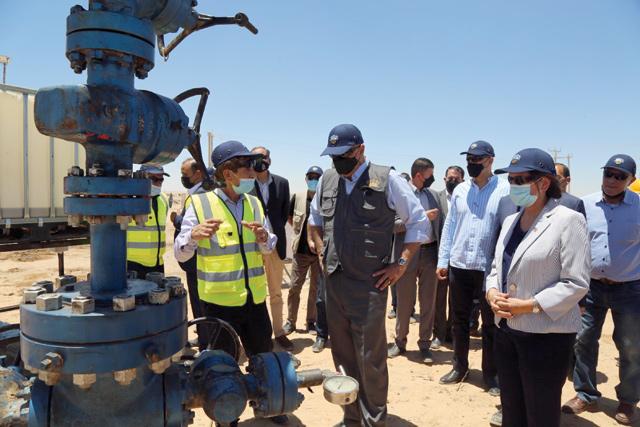- Local News
- Thu-2021-07-08 | 03:40 pm

Nayrouz News Agency :
Prime Minister and Minister of Defence Bisher Al Khasawneh on Wednesday launched operations to rehabilitate the Hamza oil field’s wells, which have so far increased production from five barrels of oil per day to between 1,500 and 2,000 barrels per day.
The result of the first development phase was approximately 52,000 barrels supplied to the Jordanian oil refinery in Zarqa, the Jordan News Agency, Petra, reported.
During the opening ceremony of the second development phase, Khasawneh voiced aspiration to conduct further exploratory studies and development work in the Hamza oil field and other promising areas.
The prime minister called for making the best use of other national oil fields and sources. He said that the Kingdom is still a way from achieving self-reliance of its oil needs, despite the Hamza field’s significant production increase and expectant well rehabilitation.
The premier noted that he will continue to tour various governorates to have a firsthand look at projects and economic activities in cooperation with the private and production sectors.
Energy and Mineral Resource Minister Hala Zawati said that the ministry has rehabilitated the Hamza field after 30 years of digging suspension, with the help of the National Petroleum Company (NPC). She said that after a drop in production to extremely low rates, production has now achieved a "remarkable” increase.
Zawati said that the Hamza field rehabilitation and its production increase was implemented through two phases, which took over two years. The first phase, which began in December 2020, took more than a year to rehabilitate the deteriorating infrastructure, Zawati noted.
The second phase included the rehabilitation of the existing wells to increase their production rates. Tests were conducted to develop the production in two out of four wells, the minister said.
Zawati said that this is the first time Jordan has produced this amount of oil, which is expected to provide the Treasury with some $40 million annually.
The minister pointed out that the Kingdom’s daily consumption of oil reaches about 140,000 barrels. The new production rate equals about 1.5 per cent of local consumption, according to the minister.









